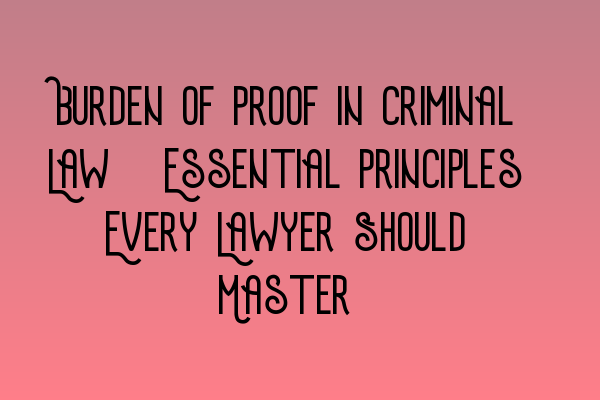Burden of Proof in Criminal Law: Essential Principles Every Lawyer Should Master
In the realm of criminal law, the burden of proof plays a critical role in determining the outcome of a case. As a lawyer, it is essential to understand the fundamental principles surrounding this concept to effectively represent your clients and navigate the judicial system. In this article, we will delve into the intricacies of the burden of proof in criminal law and explore its significance.
Understanding the Burden of Proof
The burden of proof refers to the obligation placed on the prosecution to prove the guilt of the accused beyond a reasonable doubt. It is a fundamental principle that ensures individuals are not wrongfully convicted and protects their right to a fair trial. As a lawyer, you must be well-versed in the burden of proof and its implications within the context of criminal law.
In criminal cases, the burden of proof lies with the prosecution. They are responsible for presenting evidence and establishing the defendant’s guilt beyond a reasonable doubt. This standard of proof is significantly high and requires a much higher degree of certainty compared to civil cases.
It is crucial to note that the burden of proof never shifts to the defendant. The defendant is presumed innocent until proven guilty, and it is the prosecution’s duty to provide sufficient evidence to satisfy the burden of proof. As a lawyer, it is your responsibility to challenge the prosecution’s evidence and ensure that your client’s rights are protected.
The Importance of the Burden of Proof
The burden of proof is central to the criminal justice system for several reasons. Firstly, it acts as a safeguard against wrongful convictions. Requiring the prosecution to prove guilt beyond a reasonable doubt ensures that individuals are not unjustly punished for crimes they did not commit.
Secondly, the burden of proof emphasizes the fundamental principle that the state, as the prosecuting authority, bears the responsibility of proving guilt. This principle prevents arbitrary and oppressive exercise of power by the government. It upholds the idea that the state must present compelling evidence before depriving an individual of their liberty.
Furthermore, the burden of proof enhances public confidence in the justice system. When the prosecution successfully meets the burden of proof, it validates the legitimacy and integrity of the criminal justice process. It instills trust in the community and reinforces the notion that justice is served.
Strategies for Addressing the Burden of Proof
As a lawyer, there are various strategies you can employ to address the burden of proof effectively. One approach is to scrutinize the prosecution’s evidence and identify any weaknesses or inconsistencies. By meticulously examining the evidence presented, you can challenge its credibility and raise doubt in the minds of the jury.
Another strategy is to present a robust defense case that counters the prosecution’s arguments. By presenting alternative theories or providing evidence that casts doubt on the prosecution’s version of events, you can undermine the burden of proof. Remember, your goal is not to prove your client’s innocence but rather to create reasonable doubt.
Additionally, you can strategically cross-examine the prosecution’s witnesses to elicit inconsistencies or discrepancies in their testimonies. Inconsistencies can weaken the prosecution’s case and contribute to raising reasonable doubt.
It is essential to remain vigilant throughout the trial and consistently challenge the prosecution’s adherence to the burden of proof. By conducting thorough investigations, presenting compelling counterarguments, and exploiting weaknesses in the prosecution’s case, you can effectively advocate for your client’s interests.
Conclusion
The burden of proof in criminal law is an indispensable concept that every lawyer must master. Understanding its principles and implications is crucial for providing effective representation and safeguarding the rights of your clients. By comprehending the burden of proof and employing strategic defense strategies, you can navigate the criminal justice system with confidence and strive for favorable outcomes.
For further resources related to criminal law, preparation for the SQE exams, or practice questions and mocks, you can check out the following articles:
- SQE 1 Practice Exam Questions
- SQE 1 Practice Mocks FLK1 FLK2
- SQE 2 Preparation Courses
- SQE 1 Preparation Courses
- SRA SQE Exam Dates
